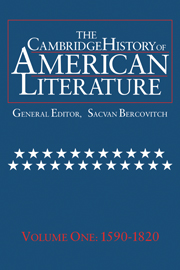Book contents
- Frontmatter
- Introduction
- THE LITERATURE OF COLONIZATION
- NEW ENGLAND PURITAN LITERATURE
- BRITISH-AMERICAN BELLES LETTRES
- THE AMERICAN ENLIGHTENMENT, 1750–1820
- 1 Finding the Revolution
- 2 What is Enlightenment? Some American Answers
- 3 Religious Voices
- 4 Writing the Revolution
- 5 The Literature of Public Documents
- 6 The Limits of Enlightenment
- THE LITERATURE OF THE REVOLUTIONARY AND EARLY NATIONAL PERIODS
- Chronology
- Bibliography
- Index
5 - The Literature of Public Documents
from THE AMERICAN ENLIGHTENMENT, 1750–1820
Published online by Cambridge University Press: 28 March 2008
- Frontmatter
- Introduction
- THE LITERATURE OF COLONIZATION
- NEW ENGLAND PURITAN LITERATURE
- BRITISH-AMERICAN BELLES LETTRES
- THE AMERICAN ENLIGHTENMENT, 1750–1820
- 1 Finding the Revolution
- 2 What is Enlightenment? Some American Answers
- 3 Religious Voices
- 4 Writing the Revolution
- 5 The Literature of Public Documents
- 6 The Limits of Enlightenment
- THE LITERATURE OF THE REVOLUTIONARY AND EARLY NATIONAL PERIODS
- Chronology
- Bibliography
- Index
Summary
The disruptive modes in sermonizing and pamphleteering in eighteenth-century America compete with the predisposition toward consensus evident in so much writing of the period. As the first chooses perception through crisis, so the second emphasizes the possibilities in reason and progress. Separate narratives, they both contribute to revolutionary discourse – sometimes in the same breath. The skill in revolutionary writing demands the promiscuous manipulation of these tendencies in prose that often tries to be provocative and encompassing at once, but an accident of history tips the balance between them. Acrimony grows on all sides in the 1780s and, with it, an intellectual preoccupation; early republicans yearn for a better definition of their experiment in government. Constitutionalism will control that quest, and its impulses are consensual in form.
From the first, American constitutionalism differs from its English equivalent in its commitment to the written word. The biblical conjunction of sovereignty and the book of law, the need for an artificially imposed order in the wilderness, and the politics of Anglo–American relations–these factors all encourage a literal documentation of governmental forms as the reference point of communal identity. Since every act of founding a new community is also a challenge to the status quo ante, the challenge itself, however implicit, must be laid to rest in new claims of authority, placement, and acceptance. Invariably, then, community in America begins in some act of writing. If such writings tend to confirm traditional beliefs, they also reconstitute those beliefs in a moment of registered agreement, and these moments in them-selves soon become a prerequisite to group identity.
- Type
- Chapter
- Information
- The Cambridge History of American Literature , pp. 470 - 495Publisher: Cambridge University PressPrint publication year: 1994

